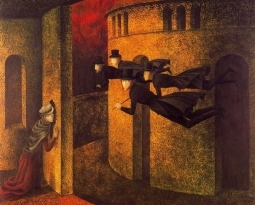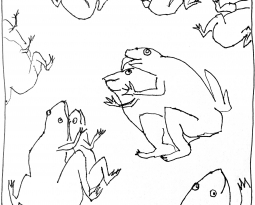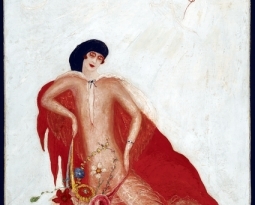61st Thread: The warrior

See how delicate you are, your small feet, fine wrists and ankles, your shoulders narrow as a princess’. My mother was built like of a castle: massive, solid, resistant. When she was but an infant in her maid’s arms, a kite swept down from the sky and pushed a feather down her throat. No one realized that was a sign. All her brothers died of diseases before adulthood, she alone survived to inherit the estate. Through the fate of her body and of geography, and of her character too, she was meant for war. We would receive news from the couriers she sent us: she had taken a tower, then the whole territory around it, to lose most of it again. But she recovered the tower, as well as a small adjoining valley where the vineyards still produce the best wine. When she wasn’t seeking to enlarge our territory, she conducted punitive expeditions, from which her troops brought back cattle and weapons. For us children, she sent carts heaped with furs and carpets, jars of honey and nuts, barrels of mead. In winter, when it was too cold to fight, she would come back to us.
Her return was a feast, we banqueted, we dressed up in extravagant clothes, we enjoyed playful chases from the top of the castle to the vaults. In the evening she read us chivalrous stories by the fire. Yet her heart was not at home, she pined for spring to return. One summer, we got news she was on her way to the castle. We knew it could only mean calamity had struck. The last survivors of her troops carried her back. We did our best to hide our tears as we followed the dismal procession up the equestrian staircase. The blood dripped from her bandaged head, staining the hems of our skirts. Her skin was pale, her eyes closed. Clasping her sword against her breast like a relic, she moaned every time the soldiers stumbled under her weight. At last they laid her down on her bed which had been protected with clean rags. We all gathered around her: my mother’s mother, who lived with us despite their feuds, cousins and aunts, and a few courtiers, women mostly. The men had not yet returned from the Holy Land.A maid took pains to undo the bandage, delicately. Her bald head appeared, pink and wrinkled. We did not know she shaved her head, which was always concealed by a helmet or a headdress. The brain bulged above the neck through a wound swimming in mucus and yellow humors and clots. The smell of rot made us gag. At last she blinked a few times, and opened her eyes. She looked at us one by one:
‘He attacked me from behind. He would not have defeated me if he had fought with honor.’
‘Mother! Mother!’ I cried, kissing her hand.
‘You see, war is not for women, whatever you say. You always wanted to outdo your brothers, and now you’ve met the doom you deserve,’ said her mother.
We listened, we watched, as still as we could. The old woman, our grandmother, sent for thread and needles. First she cleaned the wound with a dark ointment, then she pricked the needle into the skin. Mother yelped.
‘Keep still. You should not have overstepped your role as a wife. I told you many times. Be meek. Be obedient. Your brothers were to conquer, not you. If you are so brave, suffer in silence.’
Mother jumped every time the old woman pushed the needle in. Between two groans she turned to her mother:
‘And you, the only weapon … The only weapon you’ve ever handled … This needle …’
She let out a muffled grunt, while her mother pulled briskly together the edges of the wound.
‘… This needle and a viper’s tongue.’
Mother fainted, and so did I. I woke up a few hours later in this room. I was mad at myself for my want of courage. My sisters stayed with her the whole time the stitching lasted. She did not utter another word. She died two days later.





